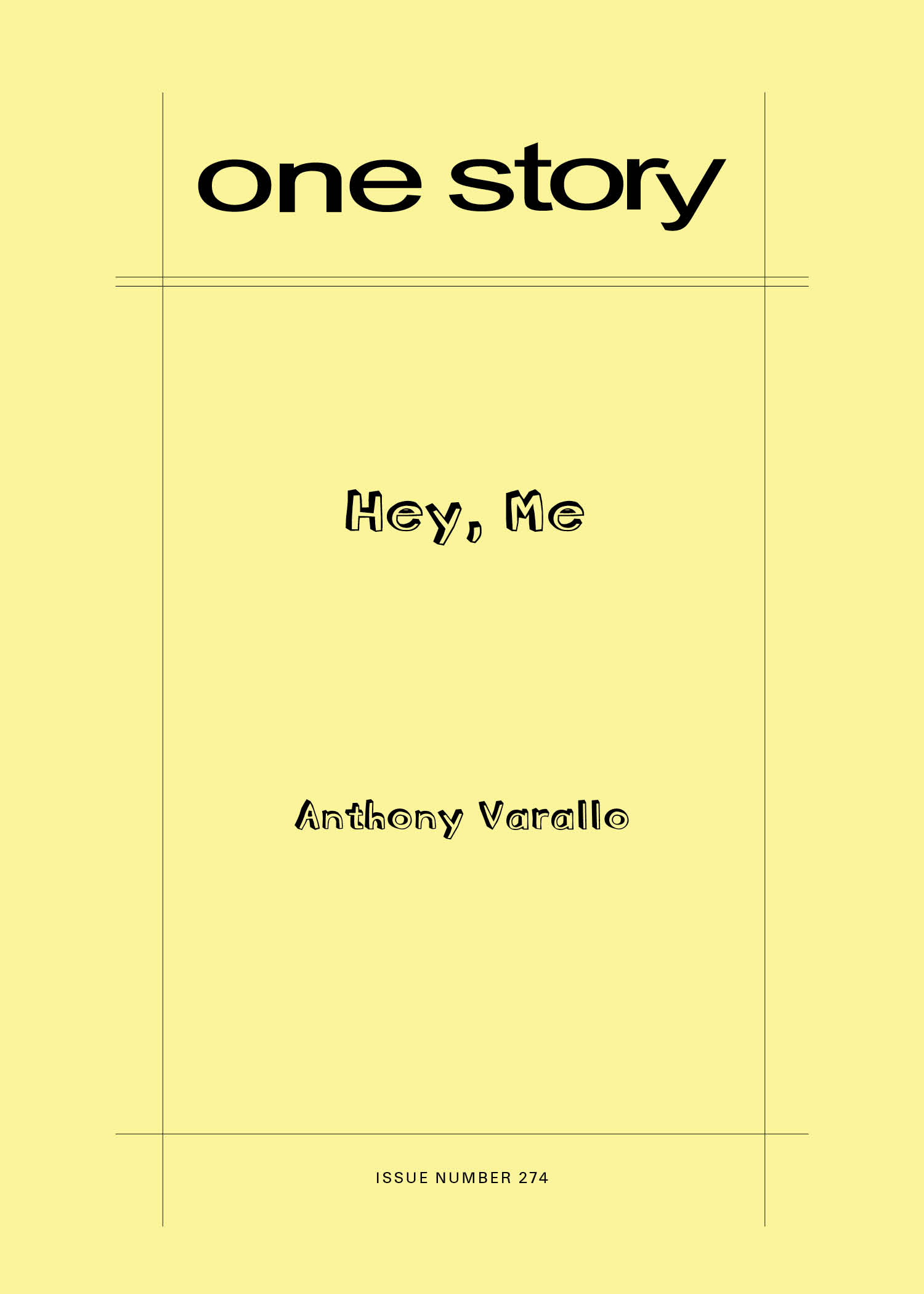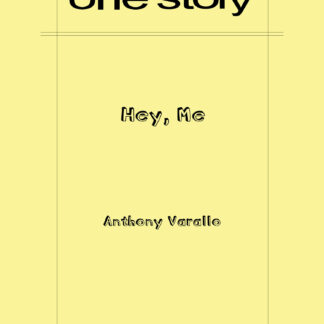
Hey, Me
$2.50
145 in stock
Excerpt
I’m checking to see if this works. Hey, this is me, checking to see if this works. Hello? Okay, I just checked, and this works. I’m back, even though you didn’t know I was gone. Ha, I say to you. Foolish you. So easily tricked by my mastery of technology.
I feel like I should say who I am and why I’m making this recording, but I think I’m the only person who will ever listen to it, unless I really do get up the nerve to send it to you, professor. Other than that happening, though, I guess there’s no point. Except to say, hey, it’s me, your one and only me, doing what you already know I’m doing and why. Today is Sunday. Weather: cloudy. Barometer: steady. Winds out of the direction they are out of.
Anthony Varallo
Anthony Varallo is the author of a novel, The Lines (University of Iowa Press), as well as four short story collections: This Day in History, winner of the John Simmons Short Fiction Award; Out Loud, winner of the Drue Heinz Literature Prize; Think of Me and I’ll Know (Northwestern University Press/TriQuarterly Books); and Everyone Was There, winner of the Elixir Press Fiction Award. He is a professor of English at the College of Charleston in Charleston, South Carolina, where he teaches in the MFA program in creative writing and serves as the fiction editor of Crazyhorse. Find him online at @TheLines1979.
Will Allison on “Hey, Me”
The first thing that struck me about Anthony Varallo’s “Hey, Me” was the disarmingly honest and funny voice of his protagonist. Amy is a struggling college student whose professor has suggested that she jumpstart her incomplete English paper by recording voice memos. The story takes the unusual form of two such memos, recorded by Amy over the course of a few days as she procrastinates writing her paper and instead ruminates on her feelings about topics such as college life, authenticity, friendship, and toast. (Yes, Amy is a bit digressive.)
But mostly Amy’s feelings are focused on her professor, a new mother Amy yearns to connect with on a deeper level. At first Amy’s obsession with her professor seems quite sweet and innocent, but her monologue takes an unexpected turn when Amy reveals that she has stalked her professor multiple times, secretly following her around campus. I couldn’t help anticipating a dark outcome, but at the same time, I wondered how Mr. Varallo would pull off an ending that remained true to Amy’s character. (He didn’t disappoint.)
During my ten years at One Story, I’ve had the pleasure of editing some unforgettable voice-driven stories. Two that come to mind are Bonnie Jo Campbell’s hard-bitten “Mothers, Tell Your Daughters,” which we published back in 2015, and last year’s luminous “Fate and Ruin,” by Mary Grimm. I’m thrilled to be introducing another story worthy of that group, and I hope you enjoy having Amy bare her soul into your ears as much as I did.
Q&A by Will Allison
- WA: What was the seed of this story? What was the first thing you wrote?
- AV: This story began with a memory of someone once telling me they had been advised to record their ideas for an incomplete paper as a means of overcoming writer’s block. I always thought that was strange advice. Somehow that memory stayed with me and served as the point of departure for “Hey, Me.”
- WA: So the story’s unusual form was part of the original conception?
- AV: Sort of yes, sort of no. Yes, because I wanted to do something with the idea of someone making a recording of themselves; and no, because another part of me said, “Wait, you aren’t seriously going to write a story as voice memos, are you? Do you know how gimmicky that sounds?” A huge challenge of writing this story was me overcoming the other part of me that objected to the idea of writing a form story at all, with all of its attendant artifice. Did I really want to do that? Was I sure? My compromise was to put some of my own ambivalence into Amy’s voice. I hope it worked.
- WA: It did. I love Amy’s voice, and “Hey, Me” is certainly one of the most voice-driven stories we’ve published. Did writing in Amy’s voice present any particular challenges?
- AV: Thank you! Yes, this story presented additional challenges to all of the usual suspects (doubts, worries, and anxieties about the limitations of one’s abilities; procrastination; fear that what you are writing is really boring, etc.). The hardest part of getting Amy’s voice right was figuring out what Amy would actually say versus what I wanted her to say, or what would be thematically resonant or pleasing for her to say. Once I realized that Amy would make sudden digressions in her monologue, or follow a line of thinking that didn’t lead anywhere in particular, I felt like I was giving her space to say what she might actually say. Those occasions were some of the most fun moments of writing the story.
- WA: What was the most challenging aspect of writing this story?
- AV: Trying not to have Amy’s voice sound like Holden Caulfield.
- WA: The college where “Hey, Me” takes place is unnamed, but did you have an actual campus in mind as the setting?
- AV: The college is a composite of several schools I’ve attended or taught at, refitted to serve my purposes. So, the bench where Amy observes the professor is clear in my memory from my undergraduate years, while the sorority bake sale is from my current campus, while the professor’s office comes closer to an office I’m probably misremembering from grad school. I assembled these locations together (against their will, most likely) into Amy’s campus.
- WA: I hope I’m not giving too much away, but when I first read “Hey, Me,” I confess I was expecting a very different ending—something violent? something sexual? something “gotcha”? At what point did you know the ending, and did you ever consider taking it in a different direction?
- AV: I didn’t know the ending until I wrote the last scene in the parking lot. I considered what might happen if Amy did something more dramatic, but those possibilities seemed unlikely to me. I’m always negotiating my endings with the voice in my head that says, “You know that something has to happen, right?” with my own preference for quiet, luminous endings that steer clear of melodrama. I hope the ending somehow honors both of those impulses.
- WA: How long did it take you to complete this story?
- AV: I started writing “Hey, Me” back in the fall of 2017, when it was part of a novel that later shifted gears into a novella. Originally, the story was much shorter, but I kept expanding it in the years since then, between other writing projects. I would estimate that it took me approximately six months to write, all in all.
- WA: What are you working on now?
- AV: I’m working on the aforementioned novella, a novel, and more stories.
- WA: What is the best bit of advice about writing you have ever received?
- AV: From my first creative writing teacher, back when I was an undergrad, after I had just submitted a really mediocre story that I thought was absolutely brilliant: “Stop showing me how sensitive you are, how smart and observant you are, how funny and clever you are, how well read and imitative you are—and just tell me a story.” In a way, I feel like my whole writing life has been an attempt to live up to that advice.
